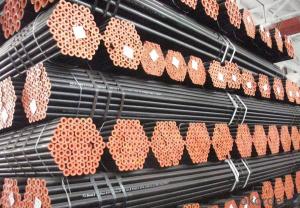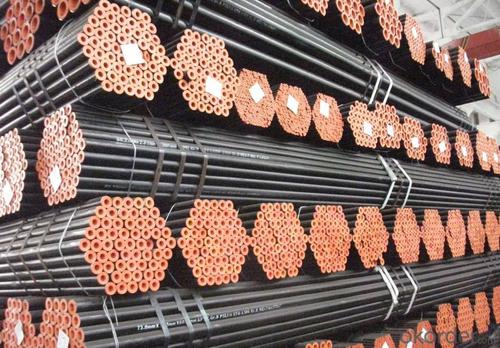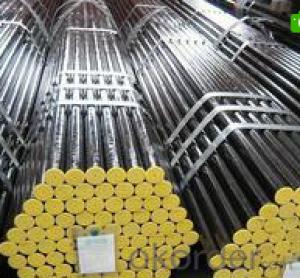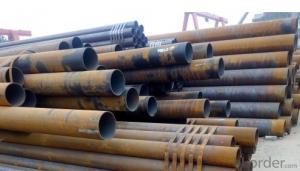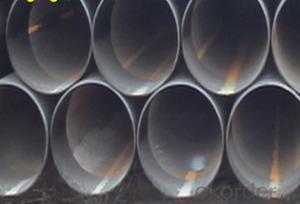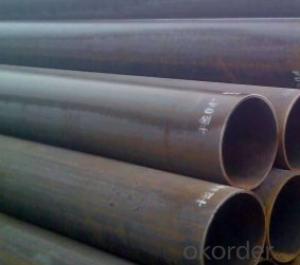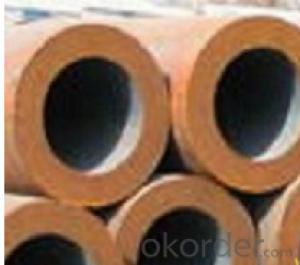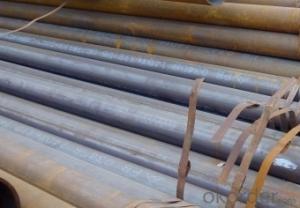Schedule 40 ASTM A53 API 5L GR.B Carbon Seamless Steel Tubes A335P91 CNBM
- Loading Port:
- Tianjin
- Payment Terms:
- TT or LC
- Min Order Qty:
- 100 m.t.
- Supply Capability:
- 1000 m.t./month
OKorder Service Pledge
OKorder Financial Service
You Might Also Like
Product Descriptions:
1. Commodity Name: Schedule 40 ASTM A53 API 5L GR.B Carbon Seamless Steel Tubes A335P91
2. Standard: API,GB,ASTM,ASME,DIN
3. Quality grade: 10#, 20#, A106B, A53B, API 5L B, Q235, Q345, ST37-2, ST 45, ST52.etc.
4. Dimension:
OD: 1/2"-24"
WT: 2.5-80mm, SCH10~SCH40~XXL
Length: 5.8m,6m,8m,9m,12m
5. Technique: Hot Rolled/Cold Rolled/ Cold Drawn
6. Application:
Carbon seamless steel pipes are widely used in gas, water and oil, transpotation;constructions;Bridge,highway,windows of model steel door; building materials;fences;heating facilities Fluid Pipe;conduit pipe,scaffolding pipe.etc.
7. Payment Terms: L/C D/A D/P T/T
8. Packing and shipment
Packaged in bundles,as per customers' requirements, it can also bepackagesd as beveled ends, typed marking, black painting, plastic caps protection,woven bags packing
For 20" container the max length is 5.8m; For 40" container the max length is 12m. other options are available based on customer requests. Please discuss when placing orders.
Packaging & Delivery
Packaging Details: | seaworthy package,bundles wrapped with strong steel strip |
Delivery Detail: | 15-30days after received 30%TT |
Seamless Steel Tubes Image
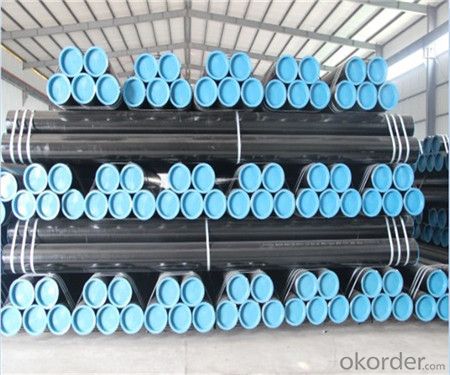
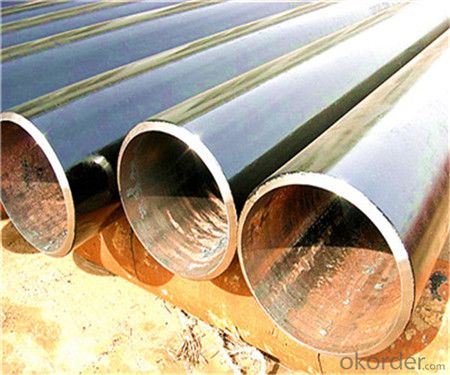
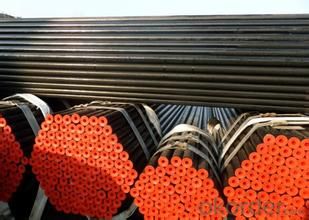
FAQ of Seamless Tube
①How is the quality of your products?
Our products are manufactured strictly according to national and internaional standard. If products’ quality don’t accord to discription as we give or the promise before you place order, we promise 100% refund.
②How about price?
We are factory and be able to give you lowest price below market one, and we have a policy that “ for saving time and absolutely honest business attitude, we quote as lowest as possible for any customer, and discount can be given according to quantity”.
③Why should you chose us?
Chose happens because of quality, then price, We can give you both.Additionally, we can also offer professional products inquiry, products knowledge train(for agents), smooth goods delivery, exellent customer solution proposals.Our service formula: good quality+good price+good service=customer’s trust
SGS test is available, customer inspection before shipping is welcome, third party inspection is no problem.
If you have any question, pls feel free to contact us !
- Q: How are steel pipes used in the construction of dams and water reservoirs?
- Steel pipes find widespread application in the construction of dams and water reservoirs owing to their remarkable durability, strength, and capacity to endure heavy loads and high pressure. These pipes serve multiple indispensable functions within the realm of dam and reservoir construction. A primary utility of steel pipes in these structures lies in their capacity to transport water. They are employed to convey water from its source, such as a river or stream, to the reservoir or dam. These pipes are engineered to withstand the elevated water pressure, ensuring a consistent flow of water to the reservoir. The durability of steel pipes enables them to remain intact even in the harshest environmental conditions. In addition to water conveyance, steel pipes are also utilized for drainage purposes. They are employed to establish drainage systems that help regulate the water level within the reservoir or dam. These pipes are strategically positioned to control the water flow and prevent potential flooding or overflow. Steel pipes are also integrated into the construction of spillways and outlets in dams and reservoirs. Spillways are designed to release excess water from the reservoir during heavy rainfall or when the water level exceeds predetermined thresholds. Steel pipes are employed in crafting these spillways to provide a controlled pathway for water discharge, thus averting any harm to the dam or surrounding areas. Moreover, steel pipes are employed in the construction of penstocks, which are large conduits that transport water from the reservoir to turbines in hydropower plants. The pressure generated by the water within these pipes propels the turbines, facilitating electricity generation. The robustness and durability of steel pipes are vital in ensuring the smooth and efficient operation of hydropower plants. All in all, steel pipes occupy an indispensable role in the construction of dams and water reservoirs. Their durability, strength, and ability to withstand high pressure render them an ideal choice for various aspects of these structures, including water transportation, drainage systems, spillways, and penstocks.
- Q: How are steel pipes used in the construction of telecommunications towers?
- Steel pipes are commonly used in the construction of telecommunications towers as they provide a strong and durable framework for supporting the tower structure. These pipes are used to create the main mast or tower structure, providing stability and strength to withstand various weather conditions. Additionally, steel pipes are often used for mounting antennas and other equipment on the tower, ensuring secure installation and efficient signal transmission.
- Q: 304 stainless steel tube with the diameter of 25*2-3 is what mean
- The quality of the steel pipe should be in line with the national standard "stainless steel seamless pipe for fluid transportation" (GBT 14976-2012) requirements.
- Q: What is the weight and strength of steel pipes?
- The weight and strength of steel pipes differ based on their dimensions and the specific steel grade utilized. Typically, the weight of steel pipes is measured in pounds per foot or kilograms per meter. The strength of steel pipes is commonly evaluated in terms of yield strength and ultimate tensile strength. The weight of steel pipes can range from a few pounds per foot for smaller sizes to several hundred pounds per foot for larger diameters and thicker walls. Various factors, including the pipe's outer diameter, wall thickness, and length, impact the weight. For example, a 1-inch diameter steel pipe with a wall thickness of 0.125 inches may weigh approximately 0.67 pounds per foot. Conversely, a 12-inch diameter steel pipe with a wall thickness of 0.5 inches can weigh roughly 142 pounds per foot. The strength of steel pipes is determined by the grade of steel used, which can vary depending on the specific application and requirements. Commonly used steel grades for pipes include ASTM A53 for general purposes, ASTM A106 for high-temperature service, and API 5L for oil and gas transportation. These grades possess different yield strengths and ultimate tensile strengths. Yield strength denotes the amount of stress a steel pipe can endure before it starts to deform plastically. It is usually measured in pounds per square inch (psi) or megapascals (MPa). For instance, ASTM A53 Grade B steel pipe has a minimum yield strength of 35,000 psi (240 MPa), while API 5L Grade X65 steel pipe has a minimum yield strength of 65,000 psi (448 MPa). On the other hand, ultimate tensile strength signifies the maximum stress a steel pipe can withstand before fracturing. It is also measured in psi or MPa. For example, ASTM A106 Grade B steel pipe has an ultimate tensile strength of 60,000 psi (415 MPa), whereas API 5L Grade X65 steel pipe has an ultimate tensile strength of 77,000 psi (531 MPa). In conclusion, the weight and strength of steel pipes can vary based on their dimensions and the grade of steel used. The weight is influenced by factors like the pipe's diameter, wall thickness, and length, while the strength is determined by the steel's yield strength and ultimate tensile strength.
- Q: What are the different types of couplings used with steel pipes?
- There are several types of couplings that can be used with steel pipes, including threaded couplings, compression couplings, and flanged couplings. Threaded couplings have threads on the inside and outside that allow pipes to be screwed together. Compression couplings use a compression fitting to connect pipes, providing a tight and secure connection. Flanged couplings have flanges on each end that are bolted together, creating a strong and durable joint.
- Q: What's the difference between stainless steel seamless tube and stainless steel welded pipe?
- Stainless steel welded pipe is also a hollow section of steel, but it is welded through the plate into the steel pipe, so there is a welded steel pipe welding gap.
- Q: Can steel pipes be used for food processing facilities?
- Yes, steel pipes can be used for food processing facilities. Steel pipes are commonly used in food processing facilities due to their durability, strength, and resistance to corrosion. They are also easy to clean, which is essential in maintaining proper hygiene standards in food processing environments. Additionally, steel pipes can withstand high temperatures and pressure, making them suitable for various food processing applications such as conveying liquids, gases, and solids. However, it is important to ensure that the steel pipes used in food processing facilities are made from materials that are approved for contact with food, and that they are regularly inspected and maintained to prevent any contamination risks.
- Q: How are steel pipes used in the construction of water supply systems?
- Steel pipes are commonly used in the construction of water supply systems due to their durability, strength, and resistance to corrosion. They are used for transporting water from sources such as reservoirs and wells to treatment plants, and then distributing it to homes, buildings, and other structures. Steel pipes are also used for transporting wastewater and sewage. Their ability to withstand high pressure and extreme weather conditions makes them ideal for ensuring a reliable and long-lasting water supply infrastructure.
- Q: How do you protect steel pipes from external damage?
- To protect steel pipes from external damage, several measures can be taken. 1. Coating: Applying a protective coating on the surface of the steel pipes can help prevent external damage. Common coating options include epoxy, polyethylene, and fusion bonded epoxy (FBE) coatings. These coatings act as a barrier between the pipes and the surrounding environment, shielding them from corrosion, abrasion, and other external factors. 2. Cathodic Protection: This method involves using a sacrificial anode or impressed current to protect the steel pipes from corrosion. By connecting a less noble metal to the pipes, it attracts the corrosive elements, sacrificing itself instead of the pipes. This process helps extend the lifespan of the pipes and prevents external damage. 3. Wrapping and Taping: Wrapping the steel pipes with materials such as polyethylene or polypropylene tapes provides an extra layer of protection. These tapes act as a barrier against moisture, chemicals, and physical impact, safeguarding the pipes from external damage. Additionally, heat shrink sleeves can be used to provide insulation and protection against corrosion. 4. Underground Installation: Proper installation of steel pipes underground is crucial to protect them from external damage. This includes ensuring suitable trench depth, backfilling with appropriate materials, and avoiding excessive bending or stress on the pipes during installation. Proper bedding and padding techniques also contribute to the pipes' protection from external factors. 5. Regular Inspection and Maintenance: Periodic inspection and maintenance are essential to detect any signs of external damage early on. This can involve visual inspections, non-destructive testing, or even utilizing advanced technologies like pipeline integrity management systems. Timely repairs and maintenance can help prevent further damage and extend the lifespan of the steel pipes. Overall, protecting steel pipes from external damage requires a combination of preventative measures, proper installation techniques, and regular maintenance. By implementing these strategies, the pipes can be safeguarded against corrosion, abrasion, impact, and other factors that may compromise their integrity.
- Q: How are steel pipes insulated against heat loss?
- Steel pipes are commonly insulated against heat loss by applying a layer of thermal insulation material around the pipes. This insulation material can be in the form of foam, mineral wool, or fiberglass. The insulation is typically wrapped tightly around the pipes and secured with adhesive or tape to ensure proper coverage. This insulation layer helps to reduce heat transfer through the pipe walls, thereby minimizing heat loss. Additionally, the insulation may be covered with a protective jacket or coating to provide further protection against external elements.
Send your message to us
Schedule 40 ASTM A53 API 5L GR.B Carbon Seamless Steel Tubes A335P91 CNBM
- Loading Port:
- Tianjin
- Payment Terms:
- TT or LC
- Min Order Qty:
- 100 m.t.
- Supply Capability:
- 1000 m.t./month
OKorder Service Pledge
OKorder Financial Service
Similar products
Hot products
Hot Searches
Related keywords
